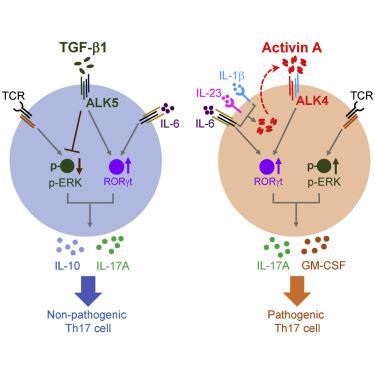Immunity ( IF 25.5 ) Pub Date : 2021-01-08 , DOI: 10.1016/j.immuni.2020.12.010 Bing Wu 1 , Song Zhang 1 , Zengli Guo 1 , Yanmin Bi 2 , Mingxia Zhou 1 , Ping Li 1 , Maryamsadat Seyedsadr 3 , Xiaojiang Xu 4 , Jian-Liang Li 4 , Silva Markovic-Plese 3 , Yisong Y Wan 1

|
Th17 cells are known to exert pathogenic and non-pathogenic functions. Although the cytokine transforming growth factor β1 (TGF-β1) is instrumental for Th17 cell differentiation, it is dispensable for generation of pathogenic Th17 cells. Here, we examined the T cell-intrinsic role of Activin-A, a TGF-β superfamily member closely related to TGF-β1, in pathogenic Th17 cell differentiation. Activin-A expression was increased in individuals with relapsing-remitting multiple sclerosis and in mice with experimental autoimmune encephalomyelitis. Stimulation with interleukin-6 and Activin-A induced a molecular program that mirrored that of pathogenic Th17 cells and was inhibited by blocking Activin-A signaling. Genetic disruption of Activin-A and its receptor ALK4 in T cells impaired pathogenic Th17 cell differentiation in vitro and in vivo. Mechanistically, extracellular-signal-regulated kinase (ERK) phosphorylation, which was essential for pathogenic Th17 cell differentiation, was suppressed by TGF-β1-ALK5 but not Activin-A-ALK4 signaling. Thus, Activin-A drives pathogenic Th17 cell differentiation, implicating the Activin-A-ALK4-ERK axis as a therapeutic target for Th17 cell-related diseases.
中文翻译:

TGF-β 超家族细胞因子 Activin-A 在自身免疫性神经炎症过程中被诱导并驱动致病性 Th17 细胞分化
已知 Th17 细胞发挥致病和非致病功能。尽管细胞因子转化生长因子 β1 (TGF-β1) 有助于 Th17 细胞分化,但它对于致病性 Th17 细胞的产生是可有可无的。在这里,我们检查了 Activin-A(一种与 TGF-β1 密切相关的 TGF-β 超家族成员)在致病性 Th17 细胞分化中的 T 细胞内在作用。复发缓解型多发性硬化症个体和实验性自身免疫性脑脊髓炎小鼠的 Activin-A 表达增加。用白细胞介素 6 和 Activin-A 进行刺激诱导了一个分子程序,该程序与致病性 Th17 细胞的分子程序相似,并通过阻断 Activin-A 信号传导而受到抑制。T 细胞中 Activin-A 及其受体 ALK4 的遗传破坏损害了体外致病性 Th17 细胞分化和体内。从机制上讲,对致病性 Th17 细胞分化至关重要的细胞外信号调节激酶 (ERK) 磷酸化被 TGF-β1-ALK5 而不是 Activin-A-ALK4 信号传导抑制。因此,Activin-A 驱动致病性 Th17 细胞分化,暗示 Activin-A-ALK4-ERK 轴可作为 Th17 细胞相关疾病的治疗靶点。











































 京公网安备 11010802027423号
京公网安备 11010802027423号